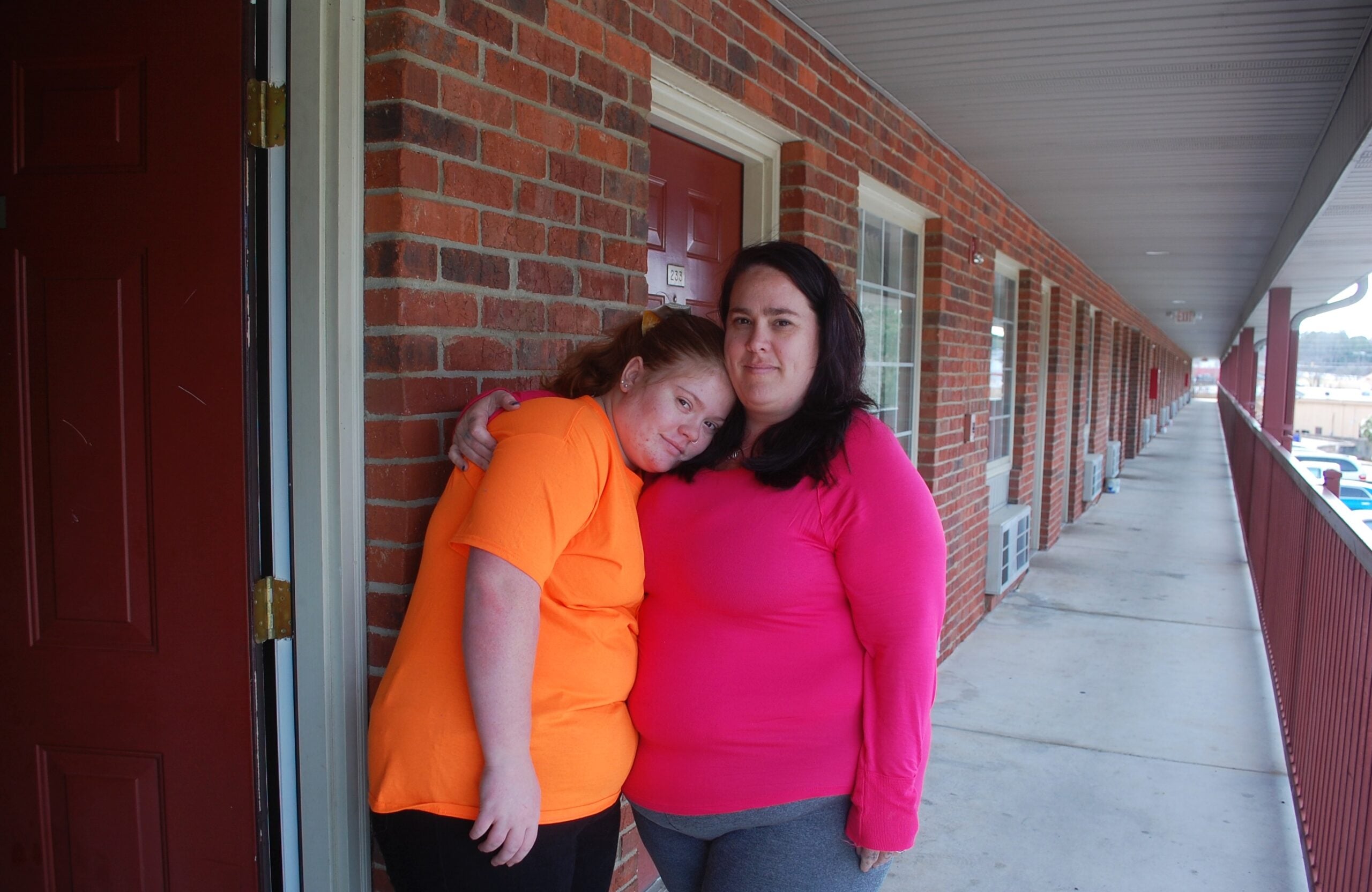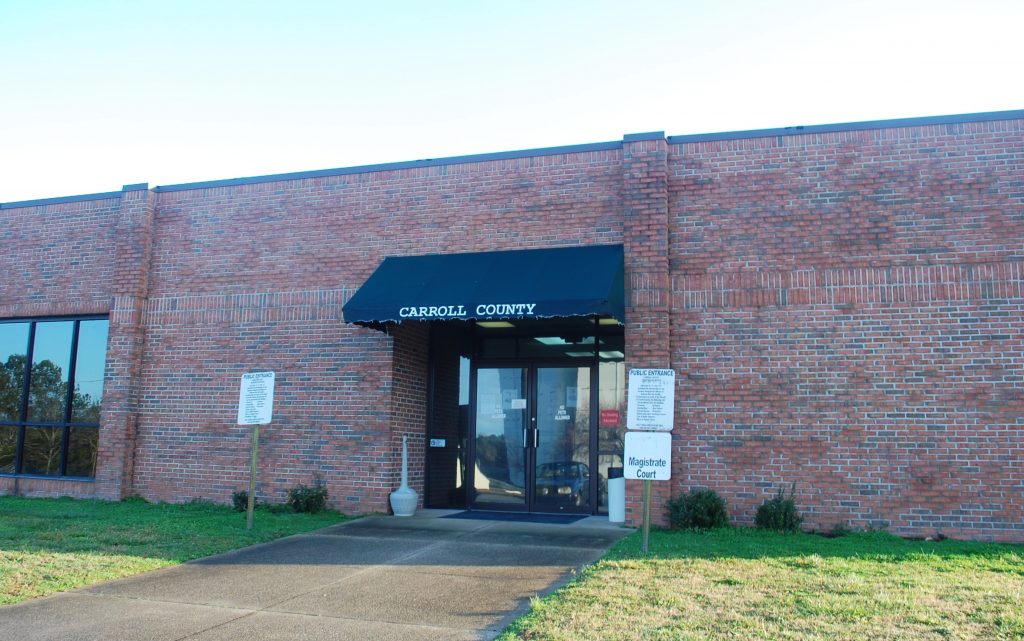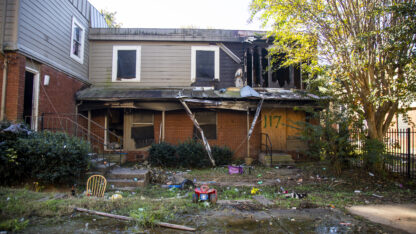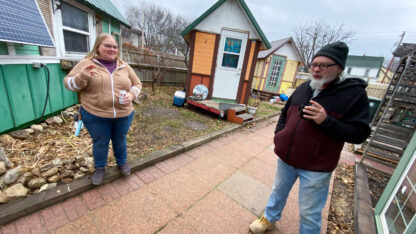'The CDC as far as I know has no control over Georgia courts': Judges continue evictions despite moratorium

Katie Duren and her family attempted to claim protections under the CDC eviction ban in Carroll County court. The judge told them he does not honor the federal order.
Stephannie Stokes / WABE
An order from the Centers for Disease Control and Prevention is supposed to protect most tenants from eviction. The public health agency argues that forcing tenants from their homes could make the virus outbreak even worse.
But as President Joe Biden extends the eviction ban until the end of March, WABE has found a couple of Georgia judges are refusing to acknowledge the federal order in court. That’s left some tenants in those counties with no option but to move.
The experience in eviction court changed Katie Duren’s view of Carroll County.
She and her family moved into a townhome community south of Villa Rica a couple of years ago after a long stretch in West Virginia. Duren originally grew up in a rural environment in Georgia and wanted the same for her kids.
“That’s what I like, walking down a dirt road to get on the school bus,” she said.
She said her family enjoyed living in Carroll County at first. Duren worked at the mall. Her husband was a mechanic. When the pandemic began, they both lost work.
She said the state never approved their unemployment.
“So we fell behind,” she said. “We had to find a new job. And it went downhill fast from there.”
After several months, Duren’s landlord filed for eviction.
That’s when her husband learned about the order from the CDC that bans landlords from evicting tenants who are behind on rent during the pandemic. Duren’s family filled out the CDC form claiming they qualified.
“We even went and got the paper notarized. That way, the judge knew that we did everything we were supposed to in a timely manner,” she said.
They showed up to the small brick courthouse in Carroll County feeling confident, she said.
But then they approached the judge. According to Duren, he didn’t even look at the CDC paper. He told them Carroll County doesn’t honor that.
“He should have just ripped it up and threw it in the trash because that’s how I felt when he said that,” Duren said.
That judge was Carroll County Chief Magistrate Alton Johnson. He and the Chief Magistrate of Coweta County represent a minority of judges who are not allowing the CDC eviction moratorium to disrupt the dispossessory process.
Johnson has no problem sharing his logic.
“The CDC, as far as I know, has no control over Georgia courts,” he said.

As Johnson recognizes, the CDC claims it has the authority to stop evictions because there is a public health emergency. But he said he doesn’t believe that authority is greater than the state’s.
Asked why most other magistrate courts in Georgia have come to a different conclusion, Johnson said he didn’t know.
“I think that if the federal government wanted to do this correctly, they would have done it by passing a law,” Johnson said, “and properly compensate those that are out of resources or money.”
He said the current eviction moratorium seems to violate landlords’ rights. He acknowledged that Congress passed $25 billion in rental assistance at the end of December, responding that the funding was not available yet.
“When you have somebody who owes a mortgage, is it fair for that individual to bear the burden of what should be a government’s responsibility?” Johnson asked. “That’s the way I look at it.”
Johnson said he could be wrong in his reasoning—he said that multiple times. He said he wishes the state would send down more instructions.
Under the first federal moratorium, put in place by the CARES Act, the Georgia Supreme Court issued a rule for magistrate courts to follow. Landlords had to swear that the eviction ban, which only covered those with government-subsidized loans, did not affect them.
The state Supreme Court said it would be improper to weigh in on magistrate courts’ interpretation of the CDC order unless a case arrived on appeal. Carroll County’s Judge Johnson said he has invited tenants to challenge his decision to a higher court.
But that can be harder than it sounds, according to Susan Reif, who leads the Eviction Prevention Project at Georgia Legal Services. She said state law requires tenants pay the rent they owe while the appeal is pending, or they could still be evicted.
“Most of our clients, when they realize they’re not going to be able to remain in possession, have to focus their energies on finding housing and alternative arrangements for their family,” she said.

Tenants who must leave their properties despite the CDC protections have little other recourse at the federal level.
They could wait to see if the U.S. Justice Department will enforce the CDC moratorium. The order said those who violate it could face a hundred thousand dollar fine.
Coweta County Chief Magistrate Judge James Stripling has argued that, while the CDC order does not prevent courts from approving evictions, landlords could face penalties for following through with those evictions.
“But that doesn’t keep someone housed that doesn’t prevent someone from going into a shelter, and it doesn’t prevent the spread of the virus,” said Reif, which is the point of the CDC moratorium.
If any story illustrates that point, it might be Katie Duren’s.
Judge Johnson ordered her family leave the property and pay back $5,000 in rent. A few days after Duren left the Carroll County courthouse, she and her husband tested positive for COVID-19.
Because of the diagnosis, her landlord, who did not want to comment for this story, allowed them to remain in their townhome for another two weeks. Duren said they were still sick when the six of them moved into their SUV. It was two nights before they got enough money for the Villa Rica hotel, where they’ve now stayed for a month.
Duren said her experience in the county’s court system confused her.
“The CDC, which is federal, said that if we did all of these things that we couldn’t be evicted,” she said. “But this one county decided that they could make their own rules.”
For now, her family has come to this conclusion: to get out of Carroll County as soon as they can.
“I don’t advise anybody to move to Carroll County,” Duren said. “Move to another county.”








